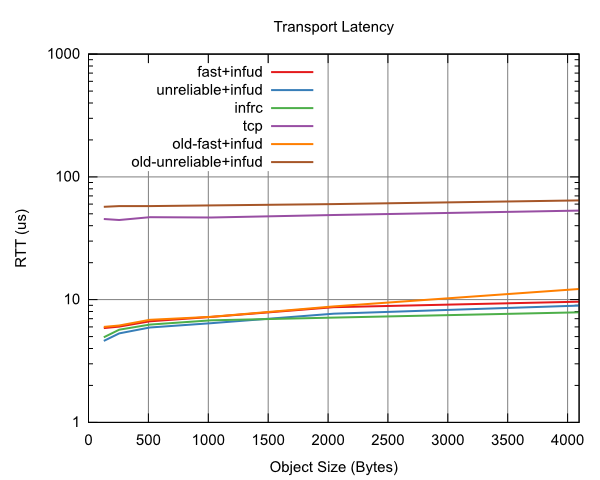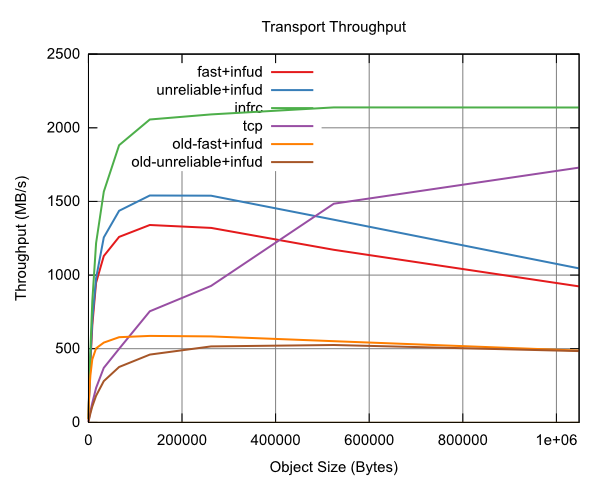FastTransport
Eval
We've written a simple benchmark that runs a single RAMCloud client against a
single RAMCloud server, and reads a single objects of a given size repeatedly.
With small object sizes, this allows us to measure the latency of our transport
protocol, and with large objects, we can measure throughput. On top of this
benchmark, we created scripts to plot latency and throughput stats from various
transports for various object sizes. These scripts were used to generate the
graphs near the bottom of this page and have been helpful in tracking our progress.
Metrics
When working on RAMCloud's recovery system, we created a special-purpose system
for gathering performance counters and timer data from the different servers.
The metrics and their presentation was specific to recovery, but the basic idea
is applicable to this project as well.
In our benchmark, the client calls into the server to start these measurements,
runs the repeated reads, and calls in again to stop the measurements. The raw
data is processed later in scripts and is conveniently available to plot
alongside the latency and throughput numbers. We've added many metrics to
FastTransport, UnreliableTransport, and InfUdDriver to help diagnose the
performance issues.
Unreliable Transport
As a comparison point for FastTransport, we created a transport that is a
minimal wrapper over our existing InfUdDriver (Infiniband Unreliable Datagram
Driver). This is the same Driver that FastTransport uses. This
UnreliableTransport we've built does not provide reliability in the face of
dropped packets or any sort of congestion avoidance, but it is still useful for
benchmarking. We also ended up adding an IP fragmentation-like feature to
UnreliableTransport in order to measure larger message sizes.
Performance Fixes
1) Because UnreliableTransport keeps no state per connection (there are no
connections), it sends responses back to where the request comes from.
Unfortunately, this requires allocating an "address handle" with the Infiniband
library. Unfortunately, the library does not cache whether the desired output
port is an Infiniband or Ethernet port; it queries the kernel every time an
address handle is created. This little issue increased RTTs by 55 us. We intend
to file a bug with Mellanox about this, but have worked around it for now.
2) In our packet based transports (such as FastTransport and
UnreliableTransport), we were appending packets to a data structure (Buffer)
containing a singly linked list while assembling messages for upper layers of
software. Adding a tail pointer to Buffer improved performance for large
transfers (1MB) by about 25%.
3) A simple coding error in UnreliableTransport resulted in a malloc call per
RTT; this added about 2 us of latency.
4) InfUdDriver previously had only one transmit buffer, which serialized work
between the server thread and the NIC. In particular, the server thread would
stall while the NIC was DMAing this buffer. We changed this to a fixed number
of buffers, which improved throughput by a factor of 2 or 3.
Results
In our initial project plan we laid out a goal of having RTT within 500 ns of
unreliable transmissions. The graph below shows that after the changes we
listed above we should be able to meet that goal.
Before performance fix (1) (shown by old-unreliable+infud) latency for small
messages was worse than TCP through the Linux kernel. After fixes, however,
unreliable+infud is slightly faster for small messages than Infiniband's native
reliable transport (infrc) which is implemented in hardware. Because fast+infud
is so close to infrc in performance and is bounded by unreliable+infud, we believe
we may actually be able to beat the hardware-based transport protocol in software.
This means we'll continue on plan with our efforts to optimize the code for
small messages with focused optimizations using our metrics system.
When it comes to throughput fast+infud has more interesting problems. Though our
measurements show we're already improved fast+infud's performance by three-fold,
it is still slower than hardware reliable Infiniband.
This graph shows that fast+infrc has an algorithmic issue which causes its
throughput to decrease as message size increases. The decrease is severe
enough that the highly optimized Linux TCP stack is able to overcome its
high overheads and beat fast+infud. More investigation will flush out the
offending code. The solution will depend on the precise problem.
Once these issues are worked out we'll need to start considering how
FastTransport behaves in a more dynamic situation. Things we need to
consider or work on:
- How does FT behave with many machines?
- In particular, several clients with one server.
- How should we deal with congestion?
- What about incast on concurrent responses from many machines?
- How should we set the window size?
- How should we set retransmit timeouts?

